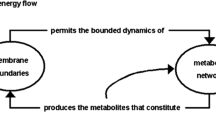Abstract
A proposal for the biological grounding of intrinsic teleology and sense-making through the theory of autopoiesis is critically evaluated. Autopoiesis provides a systemic language for speaking about intrinsic teleology but its original formulation needs to be elaborated further in order to explain sense-making. This is done by introducing adaptivity, a many-layered property that allows organisms to regulate themselves with respect to their conditions of viability. Adaptivity leads to more articulated concepts of behaviour, agency, sense-construction, health, and temporality than those given so far by autopoiesis and enaction. These and other implications for understanding the organismic generation of values are explored.
Similar content being viewed by others
References
Ashby, W. R. 1960. Design for a Brain: The Origin of Adaptive Behaviour (Second edition). London: Chapman and Hall.
Bachmann, P. A., Luisi, P. L. and Lang, J. 1992. Autocatalytic self-replicating micelles as models for prebiotic structures. Nature 357: 57–59.
Bennett, J. 1984. A study of Spinoza's ethics. Cambridge: Cambridge University Press.
Bennett, J. 1990. Spinoza and Teleology: A Reply to Curley. In: E. Curley and P.-F. Moreau (eds.), Spinoza, issues and directions, pp. 53–57. Leiden: E. J. Brill.
Boden, M. A. 1999. Is metabolism necessary? Brit. J. Phil. Sci. 50: 231–248.
Bourgine, P. and Stewart, J. 2004. Autopoiesis and cognition. Artificial Life 10: 327–346.
Canguilhem, G. (1991/1966). The normal and the pathological. New York: Zone Books.
Curley, E. (1990). On Bennett's Spinoza: The issue of teleology. In: E. Curley and P.-F. Moreau (eds.), Spinoza, issues and directions, pp. 39–52. Leiden: E. J. Brill.
Duchesneau, F. 1974. Du modèle cartesien au modèle spinoziste de l'être vivant. Canadian Journal of Philosophy 3: 539–562.
Gallagher, S. 1997. Mutual enlightenment: Recent phenomenology in cognitive science. J. Consc. Studies 4: 195–215.
Gánti, T. 2003. The principles of life. Oxford: Oxford University Press.
Goldstein, K. (1995/1934). The organism. New York: Zone Books.
Jonas, H. 1966. The phenomenon of life: Towards a philosophical biology. Evanston, IL: Northwestern University Press.
Jonas, H. 1968. Biological foundations of individuality. International Philosophical Quarterly 8: 231–251.
Jonas, H. 1979. Spinoza and the theory of organism. In M. Grene (ed.), Spinoza: A collection of critical essays, pp. 259–278. Notre Dame, IN: The University of Notre Dame Press.
Kohler, I. 1964. The formation and transformation of the perceptual world. Psychological Issues 3: 1–173.
Langer, S. K. 1967. Mind: An essay on human feeling. Volume 1. Baltimore, USA: The Johns Hopkins Press.
Matson, W. 1977. Death and destruction in Spinoza's Ethics. Inquiry 20: 403–417.
Maturana, H. 1975. The organization of the living: A theory of the living organization. Intl. J. Man-Machine Studies 7: 313–332.
Maturana, H. 2002. Autopoiesis, structural coupling and cognition: A history of these and other notions in the biology of cognition. Cybernetics and Human Knowing 9: 5–34.
Maturana, H. and Varela, F. J. 1980. Autopoiesis and cognition: The realization of the living. Dordrecht, Holland: D. Reidel Publishing.
McMullin, B. 2004. Thirty years of computational autopoiesis: A review. Artificial Life 10: 277–296.
Merleau-Ponty, M. 1962. Phenomenology of perception. London: Routledge.
Merleau-Ponty, M. 1963. The structure of behaviour. London: Methuen.
Moreno, A. and Ruiz-Mirazo, K. 1999. Metabolism and the problem of its universalization. BioSystems 49: 45–61.
Ono, N. and Ikegami, T. 2000. Self-maintenance and self-reproduction in an abstract cell model J. Theoret. Biol. 206: 243–253.
Ruiz-Mirazo, K. and Moreno, A. 2000. Searching for the roots of autonomy: The natural and artificial paradigms revisited. Communication and Cognition – Artificial Intelligence 17: 209–228.
Ruiz-Mirazo, K. and Moreno, A. 2004. Basic autonomy as a fundamental step in the synthesis of life. Artificial Life 10: 235–260.
Szostak, J. W., Bartel, D. P. and Luisi, P. L. 2001. Synthesizing life. Nature 409: 387–390.
Thompson, E. 2004. Life and mind: From autopoiesis to neurophenomenology. A tribute to Francisco Varela. Phenomenology and the Cognitive Sciences 3: 381–398.
van Gelder, T. 1999. Wooden iron? Husserlian phenomenology meets cognitive science. In: J. Petitot, F. J. Varela, B. Pachoud and J.-M. Roy (eds.), Naturalizing phenomenology, pp. 245–265. Stanford, CA: Stanford University Press.
Varela, F. J. 1979. Principles of biological autonomy. New York: Elsevier, North Holland.
Varela, F. J. 1991. Organism: A meshwork of selfless selves. In: A. I. Tauber (ed.), Organism and the origin of the self, pp. 79–107. Netherlands: Kluwer Academic Publishers.
Varela, F. J. 1996. Neurophenomenology: A methodological remedy for the hard problem. J. Consc. Studies 3: 330–350.
Varela, F. J. 1997. Patterns of life: Intertwining identity and cognition. Brain and Cognition 34: 72–87.
Varela, F. J. 1999. The specious present: A neurophenomenology of time consciousness. In: J. Petitot, F. J. Varela, B. Pachoud and J.-M. Roy (eds.), Naturalizing phenomenology, pp. 266–314. Stanford, CA: Stanford University Press.
Varela, F. J., Maturana, H. R. and Uribe, R. 1974. Autopoiesis: The organization of living systems, its characterization and a model. BioSystems 5: 187–196.
Varela, F. J., Thompson, E. and Rosch, E. 1991. The embodied mind: Cognitive science and human experience. Cambridge, MA: MIT Press.
Weber, A. and Varela, F. J. 2002. Life after Kant: Natural purposes and the autopoietic foundations of biological individuality. Phenomenology and the Cognitive Sciences 1: 97–125.
Author information
Authors and Affiliations
Corresponding author
Rights and permissions
About this article
Cite this article
Di Paolo, E.A. Autopoiesis, Adaptivity, Teleology, Agency. Phenom Cogn Sci 4, 429–452 (2005). https://doi.org/10.1007/s11097-005-9002-y
Published:
Issue Date:
DOI: https://doi.org/10.1007/s11097-005-9002-y



